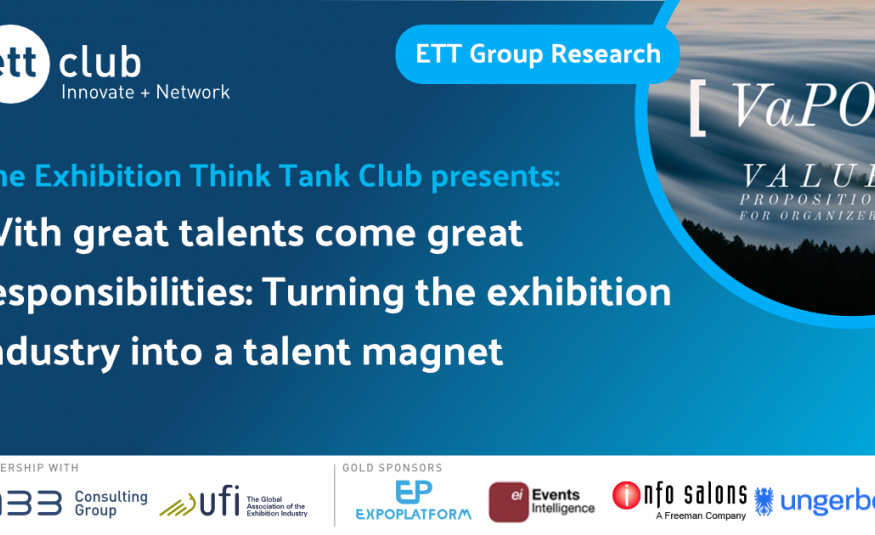The Exhibition Think Tank shares the work of its focus group, VaPOr (Value Proposition for Organisers’ Group), which worked last year on the challenge of attracting and retaining talent
The VaPOr Group is a group of like-minded event professionals who love to learn and share, and last year embarked on a journey to identify some of the keys to unlock the talent problem. Mark Parsons, MD Events Intelligence; Mike Frost, co-founder, Expocast and Stephan Forseilles, head of technology and digital transformation, Easyfairs, led groups which also included Baptiste Boulard (Swapcard), Cinzia Zanin (Fondazione Fiera Milano), Andreas Zuege (Fiera di Hannover), Paul Grinnall (GM+A) and Jorgelina Guandalini (UFI). Their discussions resulted in the White Paper: ‘Establishing why talent is such a critical resource in the post-Covid exhibition industry’.
The Group hopes the paper can present a roadmap for change and set out to interview experts in their networks, collecting views on specific topics with the purpose of discovering the best, most original, and sometimes controversial ideas.
Interviewees were not only from the HR area: there are consultants, teachers, CEOs, event makers, students and more, and not just from the exhibition industry. The group wanted to ‘broaden the horizon’ and see how things are done elsewhere.
The first question was about changes in the exhibition industry and the move to hybrid and to what extent respondents felt we are missing key skills in our organisations to satisfy the new needs of our customers.
The interviewees gave two main reasons why talent is a problem now:
“We lost a lot of good people during the pandemic who went away to less impacted industries.”
“The pre- and post-Covid exhibition industry are two different ‘beasts’ and the hybrid world that unfurls requires a whole other set of skills.”
Finding partners that have those skills and outsourcing to them seems a viable short-term alternative to some. But, longer term, if we consider that hybrid will be part of our core business, having those skills in-house seems a priority, at least for larger organisations.
New skills
The kind of new skills the exhibition industry requires post-pandemic clustered in four main areas: Markets & Communities, Culture, Business and Technology.
Fishing for those talents (e.g., from the worlds of Tech, Finance, Retail, Real estate, Banking/insurance, Other) could be done in certain sectors, but we still need to find ‘new blood’ elsewhere as there are not enough (digital) talents in the room. Tech Industry, Retail industry, Media, Hospitality and Gaming are all sectors respondents suggested we should investigate.
Another question was what approaches the industry should be using to attract talent from other sectors. Responses grouped in four main categories: Image & branding (working on our image and showing how dynamic an industry we are). For a cause (making sure we don’t only strive building communities, but also strive to make the world a better place). Care about people (after a terrible period, it is essential that we make sure we take better care of people in our industry). Data (and being sure to use it when recruiting).
Acquiring talent is important, but keeping the ones we have is an even better option. The group asked what strategies the exhibition industry needed here and a key aspect that came out is salaries, particularly when looking for digital talents. Most interviewees agreed we are not a very well-paying industry.
New Ways of Working (WoWs), being more flexible and offering a way to evolve and thrive were also flagged as important. And company culture, including entrepreneurial mindsets, seems to be attracting the best talents. “We have to make ourselves more exciting. We’ve been resting on our laurels because we never had problems hiring in the past because few people were leaving the industry,” was how one HR Consultant summed things up.





